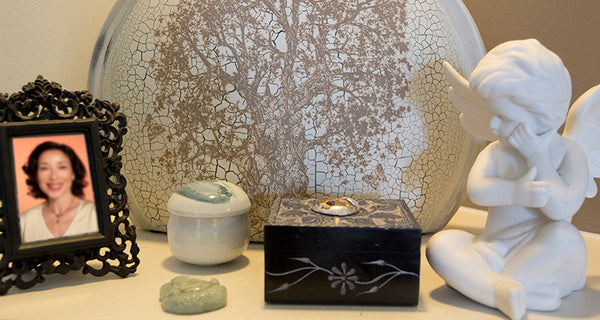
As cremation becomes increasingly popular, people often choose a cremation urn, ash jewelry or other memorial keepsake to be kept in their home. “It’s a way of keeping her close,” explained John, recently widowed after 27 years of marriage. “Realizing I will never see her again was unspeakably painful. It’s comforting to look at the beautiful urn on the mantle, custom engraved with Jen’s name.
Lots of widows and widowers share John’s feeling, keeping their dearly departed remains in a customized urn, a necklace, or made into a diamond. But where to put it-on the nightstand, on a shelf, or inside a drawer with other mementos -is a little more complicated if and when they enter into a new, romantic relationship.
The comfort object can become a source of conflict.
I thought I could handle it. A picture of my boyfriend’s late wife was prominently displayed in the living room. We talked about everything: His experience of being a 24/7 caregiver, making cremation arrangements, and creating a meaningful memorial service as a final tribute to their love. I felt honored to bear witness to the profound loss that has been pivotal in shaping the man he is today.
But then things changed. It wasn’t about her ongoing presence in our relationship; I knew she would always be a part of him, just as the significant men in my life will always be a part of me.
No. It was the ashes. A year into our relationship, I asked about her remains. He pointed to a marble keepsake urn on his mantle. Suddenly she was right there in the room. I began to wonder if her clothes were in some private drawer. What about their rings?
Other fears and insecurities surfaced: Would his late wife permanently occupy a corner of his heart, reserved for just the two of them? Would he risk committing again after suffering such unspeakable pain? And how could I ever compete with the sanctified memory of his lost love, forever frozen in time, all transgressions forgiven through am indelible bond, given all they’d been through together.
A recent survey of people romantically involved with widows or widowers reveals how this can become a loaded issue:
“I had trouble looking at the urn, which he kept on an end table. Just knowing it held her ashes made me a little uneasy. I wondered if this was his way of always holding on to her.”
“When I met Kathy, she had scattered Bill’s ashes in the Pacific Ocean, near their favorite campground, which was very moving. But then he showed me the ashes he’d kept, folded inside a blown glass candle. He admitted he lit it on the nights we didn’t spend together.”
“It creeped me out knowing the woman I’d fallen in love with kept a pouch containing her partner’s ashes in his sock drawer. When she really longed for him, she placed it under her pilllow. We started spending most of our time at my place, so that I wouldn’t feel like there were three of us in the bed.”
Keeping a loved one’s ashes close honors his or her memory and can be part of the healing process. On the other hand, many people are uncomfortable being involved with someone whose late spouse is, metaphorically speaking, a permanent fixture in their relationship. This can turn into a full-blown deal-breaker, as evidenced by over 450 very outspoken comments on a related post on Reddit.
I have to say, it made me a feel a little better knowing I wasn’t the only one.
How have you dealt with where to put the cremation urn or other memorial keepsake? If you’re dating or married to a widow or widower, how do you react to visible remains of the past being present?
Here is the results of our survey on Facebook:
Ellen Sue Stern is the author of twenty books, translated to fourteen languages, including I Will Not Forget You: Daily Meditations for Grieving Widows and Widowers and Living with Loss. Visit her at Facebook and ellensuestern.com.
